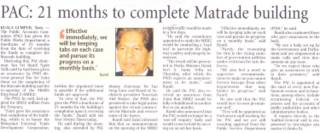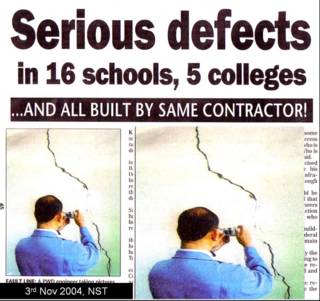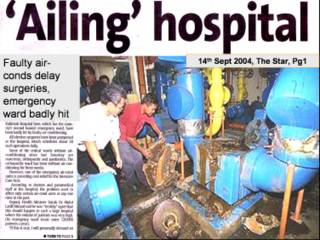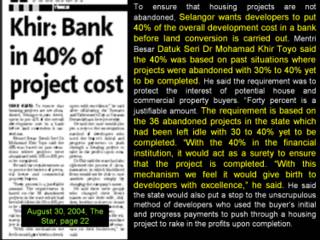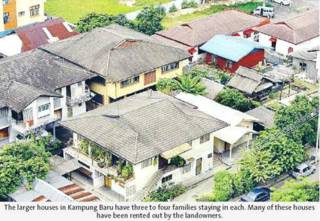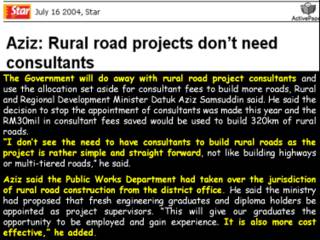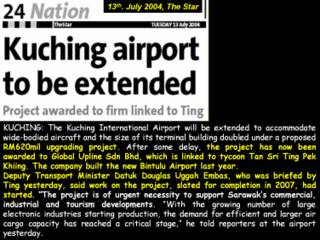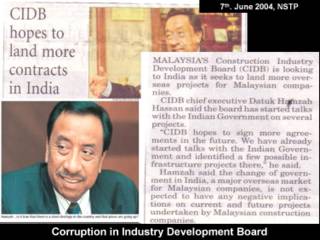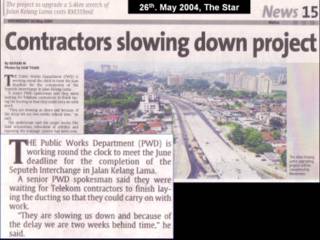
On May 21st 2004, it was reported that "The government had put on hold the privatization of water supply in some states until a regulatory body to monitor water management is set up.
“I urge on-going privatization schemes to hold on to your horses because without benchmarks, the Government will in the end, be left with something unmanageable,” Dr. Lim Keng Yaik told reporters in KL on the 20th May.
Dead serious about improving the quality of water supply and services in the country, the Government is moving to set up by the end of this year a commission to be the sole regulator of the nation’s multi-billion ringgit water sector.
"We hope to do it by the end of this year," Dr Lim told the New Straits Times (March 3, 2004, NST). "I have to implement the National Water Council decision of last year for the Federal Government to take over the management of water from the States." To facilitate the establishment of the proposed National Water Services Commission, new legislation or even constitutional amendments may be necessary," he said. The proposed commission will oversee water supply and related services in all States except Sabah and Sarawak.
On July 27, as reported in StarBiz, Dr. Lim was reported to say that the Government was not asking for the “impossible” when it asked water operators and independent power producers to renegotiate their terms of agreement under the current structure of its privatisation scheme. Water, Energy and Communications Minister Datuk Seri Dr Lim Keng Yaik said the Government was merely asking the players in these two sectors to consider a new holistic structure in the utilities segment to make it more financially viable. “Many banks have come forward to offer their expertise to finance such projects and this shows that utilities projects are bankable,” he told a seminar in Kuala Lumpur yesterday. The Government was expected to invest RM50bil over the next five years to improve water and sewerage services, he said, adding that the amount was a third of the total to be spent under the 9th Malaysia Plan. He said given the huge investment, it was the ministry’s objective to establish a new model for the utilities sector, which would attract private investment and enable the industry to be self-financing and able to deliver to consumers first-rate service at a reasonable tariff.
On August 6, a group of 15 organization and associations, headed by Selangor Malay Chamber of Commerce and SYABAS Chairman, Tan Sri Rozali Ismail submitted a memorandum, addressed to Prime Minister calling on the Government to speed up the privatisation of water supply, if it had decided to do so. It was handed to Domestic Trade and Consumer Affairs Minister Datuk Shafie Apdal during a dialogue with the Selangor Malay Chamber of Commerce here today. Tan Sri Rozali Ismail said frequent water supply disruptions, poor water quality, low water pressure and other forms of water supply problems had consistently affected consumers. Among the points raised in the memorandum was that consumers were now having to purchase individual water filters as a result of poor water quality. Another was that consumers do not want to hear continuously about financial difficulties and the hassles of government bureaucracies before any suggested solution is put forward. An example is the setting up of the National Water Commission. The time that would take for it to be set up has been used as an excuse for not implementing remedial works and integrated actions to solve the problems. Another point raised was that inefficient management and planning of water resources had contributed to the increased level of water lost through leaking pipes, burst pipes and rampant illegal supply connections. These are the factors why water is not a revenue earner. Rozali said if immediate steps were not taken to solve the problems, it would be the consumers who would suffer and subsequently their businesses would be affected in many ways. "Consumers are often informed of the problems causing the lack of water supply but they are not being solved," he said.
On the same day, The Star reported that Dr. Lim had gathered a group of industry players to voice their other concerns pertaining to the water privatization scheme. The water industry players have urged the Government to review some of the contracts awarded by some states, saying they are inconsistent with the current plan to centralise water supply operations in the country. They said some of the contracts were only awarded recently, but not through the Economic Planning Unit (EPU), which oversees privatisation projects. “There could be some irregularities in the way certain contracts were awarded and they should be reviewed in the spirit of creating a level playing field for all water industry players,” an executive with one of the companies told StarBiz. Such concerns were voiced by industry players during a series of meetings organised over the past week by the Ministry of Energy, Water and Communications. “Most players in the state are unhappy about how some of the water contracts were unequal with one company enjoying higher rates than the others,” the executive said, adding that in one instance, payments received by a water company from the state government were based on its total capacity rather than its actual production, as was the case with other water firms. The difference in contract pricing, he said, had resulted in a higher water bill for the state water body, Perbadanan Urus Air Selangor Bhd (PUAS), which had to pay for treated water it did not use. In the long run, such contracts would also disadvantage consumers, the executive said.
On December 9, StarBiz reported that the Government has awarded the privatization of the management of water supply operations in Selangor, Kuala Lumpur and Putrajaya to Puncak Niaga group and Kumpulan Darul Ehsan Bhd.
On December 16, Dr Lim Keng Yaik was reported to say that “Klang Valley’s six million water consumers must be prepared for a 15% tariff hike in a year’s time.
Thus conclude the episode of National Water Services Commission Plan that most likely will not come into fruition, after all the HUHA...
Tan Sri Rozali had won and Dr. Lim can now think of retirement.
For the past many months since the loud proclaimation that the National Water Commission must be set up before the finalization of the water privatization scheme and the firm and unwavering stand of Dr. Lim, I thought, Malaysia now has ONE MINISTER who dares to stand tall and firm and will see his vision through reality. I stood by him, believing that he would not budge, that he is fully convinced that the Water Commission was what we need to resolve the long-term water problem and to set the standards for all other Ministers to Benchmark.
Alas, for whatever reason, either political pressure or self-weakness, the supposedly firm and courageous Minister falls, hard into the garbage bin.
PUAS $1 billion problem is no big deal for the government if they wanted to inject those money into PUAS. The Government can just get EPF to pay by way of issuing Government securities to EPF. So, the excuse that PUAS is in critical and dire straits is paranoid. The truth is, Politcal Maneuvering and Kelptorism.
It concludes that, we actually do not have a man strong enough to stand tall and willing to stretch his neck out, if necessary to be chopped, for the sake of his Vision, Mission and Objectives in the best interest of the Rakyat.
At such, the loser is not keng Yaik, but the Rakyat who will have to pay 15% extra in one year time and thereafter, .....only you can predict the outcome, the price of privatization.
God cannot help those who can't help themselves - the Rakyat!
God certainly help SYABAS ....and it's truely Syabas to Rozali.



